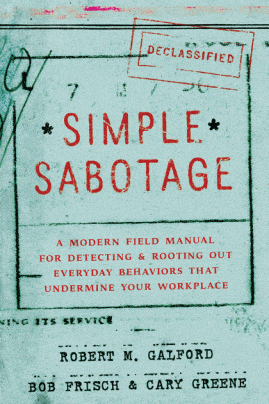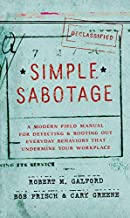Simple Sabotage: A Modern Field Manual for Detecting and Rooting Out Everyday Behaviors That Undermine Your Workplace by Robert M. Galford, Bob Frisch, Cary Greene
 At the height of World War II, the American Office of Strategic Services, or OSS—the forbearer of the modern CIA—published a handbook for resistance fighters operating behind enemy lines. The Simple Sabotage Field Manual instructed Allied supporters on how to slow down the Axis machine from within. Slashing tires, stopping up fuel lines, starting fires, shorting out electrical systems and damaging machine parts were all little things that resistance operatives were urged to do.
At the height of World War II, the American Office of Strategic Services, or OSS—the forbearer of the modern CIA—published a handbook for resistance fighters operating behind enemy lines. The Simple Sabotage Field Manual instructed Allied supporters on how to slow down the Axis machine from within. Slashing tires, stopping up fuel lines, starting fires, shorting out electrical systems and damaging machine parts were all little things that resistance operatives were urged to do.
By themselves, these actions didn’t add up to much, but the cumulative effect, it was hoped, would greatly hinder the Axis’s march across Europe. The manual was intended to inflict death by a thousand cuts to the enemy.
Also within the manual was a list of eight tactics designed to attack the Axis’s organizational structure—in particular, its decision-making processes and efficiency. And we warn you, when you read them, they might sound eerily familiar.
That’s because these eight habits are things that “occur every day and all around the world in all sizes of working groups, from global corporations and nonprofits, to schools and church committees, to small businesses,” write authors Robert M. Galford, Bob Frisch and Cary Greene. “Some of them, no doubt, occur in yours.”
Galford, Frisch and Greene are the authors of Simple Sabotage: A Modern Field Manual for Detecting and Rooting Out Everyday Behaviors That Undermine Your Workplace (HarperOne; September 29, 2015). The book uses the original OSS handbook to identify the harmful behaviors which, completely unintentionally, may be slowing down your organization.
“Left unchecked,” they write, [these] behaviors will, at the least, undermine your group or organization, slowing down its—and your—best efforts. In the worst-case scenario, they will grind the gears to a halt.”
What exactly are these diabolical habits? Here are the eight tactics from the original Simple Sabotage Field Manual:
- Insist on doing everything through “channels.” Never permit short-cuts to be taken in order to expedite decisions.
- “Make speeches.” Talk as frequently as possible and at great length. Illustrate your “points” by long anecdotes and accounts of personal experiences. Never hesitate to make a few appropriate “patriotic” comments.
- When possible, refer all matters to committee “for further study and consideration.” Attempt to make the committees as large as possible—never less than five.
- Bring up irrelevant issues as frequently a possible.
- Haggle over precise wordings of communications, minutes and resolutions.
- Refer back to key matters decided upon at the last meeting and attempt to reopen the questions of the advisability of that decision.
- Advocate “caution.” Be “reasonable” and urge your fellow-conferees to be “reasonable” and avoid haste which might result in embarrassments or difficulties later on.
- Be worried about the propriety of any decision—raise the question of whether such action as is contemplated lies within the jurisdiction of the group or whether it might conflict with the policy of some higher echelon.
Any of these sound familiar?
“These eight tactics sound relatively harmless, don’t they? In fact, aren’t they aspects of the very behaviors that are necessary to the health of any group of people working together?” write the authors. “These are good behaviors, but taken to an extreme. That’s why they’re insidious.”
While the Simple Sabotage Field Manual has been declassified for years, “the acts of sabotage recommended in it are no less subtle and no less corrosive than they were more than 70 years ago,” the authors write. “But rooting out these corrosive behaviors isn’t so simple, since they are often mutant excesses of laudable aspects of organizational life and group behavior.”
According to the authors, inoculating any working group against this kind of unintentional sabotage requires several stages. The sabotage must be identified, group members must be shown how productive behavior is encouraged while sabotage is prevented, techniques must be created to allow damaging behavior to be called out in a constructive way, and an environment must be created to reduce and eliminate sabotage. This way, according to the authors, “you will increase your effectiveness, spur creativity and improve working relationships.”
The OSS was successful in placing the Simple Sabotage Field Manual in the hands of countless resistance fighters during World War II—and we all know how that worked out for the Axis. Thanks to this new take on Simple Sabotage, we can find out how to protect ourselves from the little things that can erode our organizations from within.
Buy this Book!
Amazon





